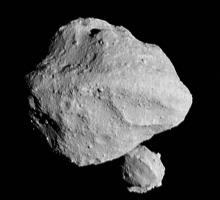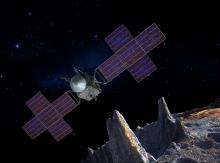Listen to today's episode of StarDate on the web the same day it airs in high-quality streaming audio without any extra ads or announcements. Choose a $8 one-month pass, or listen every day for a year for just $30.
You are here
Close Calls
A couple of cosmic boulders will slide past Earth early tomorrow. Neither one is big enough to see without a large telescope. And neither is a threat to hit us. But they show that Earth shares this region of space with some potentially nasty neighbors.
The boulders are asteroids — chunks of rock and metal that orbit the Sun. Their paths cross Earth’s, so they occasionally fly quite near our planet.
Asteroid 2020cx1 will miss us by 1.7 million miles — 600,000 miles farther than its previous encounter, exactly one year ago. The asteroid probably is no more than a couple of hundred feet in diameter.
Another asteroid will pass even closer just a couple of hours earlier. 2018cw2 will miss us by about half a million miles. It’s probably not as big as 2020cx1, but it could be big enough to cause localized damage if it were to hit Earth. It’s in the same size range as an asteroid that exploded in the skies above Russia in 2013, shattering windows and injuring more than a thousand people.
2018cw2 isn’t expected to pass this close again until 2193. But the timing of that encounter is uncertain. So it’s possible that the boulder could miss Earth by as little as a couple of hundred miles — or it might not miss us at all.
To nail down its orbit, NASA is tracking its current passage. That will give us a better idea of whether future generations will need to worry about this cosmic boulder.
Script by Damond Benningfield





